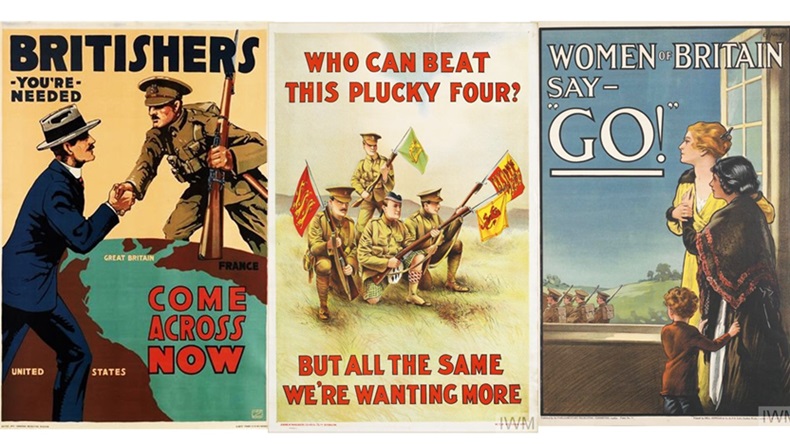.
A Recruiter Tells It as It Isn’t
Your World War One recruitment agent prays
he finds you well. Your King and Country says
we need you for a dalliance in France.
In gay Paris, you’ll get to chat and dance
with mademoiselles before you reach the Front.
With pals, in cozy trenches, you will hunt
for impish rats, and dig away with spades
to make a den. Then when the daylight fades,
the sky lights up with firework displays.
And if you see a smoky-yellow haze
advancing on you, don your quirky mask.
You’re fed on top-notch corned beef, though the task
that counts the most is going o’er the top,
to cross a course of obstacles then flop
and frolic in the mud, while being bound
to only serve till Christmas comes around.
first published in The Spectator
.
.
Rondeau on the 80th Anniversary of D-Day
They went to France eight decades past,
a stalwart and heroic cast
from Britain, from the USA
and Canada. They joined the fray
and left their enemies aghast.
The German soldiers, holding fast,
to allied might succumbed at last.
Though seas were looming waves of grey,
__they went to France.
Through bullets, mines and mortar blast,
their colours fastened to the mast,
they crawled, they ran (while others lay
with wounds, or worse), and cleared the way
to victory that’s unsurpassed.
__They went to France.
.
.
Paul A. Freeman is the author of Rumours of Ophir, a crime novel which was taught in Zimbabwean high schools and has been translated into German. In addition to having two novels, a children’s book and an 18,000-word narrative poem (Robin Hood and Friar Tuck: Zombie Killers!) commercially published, Paul is the author of hundreds of published short stories, poems and articles.















Two well-crafted poems for Armistice day. I particularly enjoyed the rondeau which flows effortlessly. A beautiful tribute. Thank you.
Thank you for reading and commenting Isabella. To sacrifice so much, even if you come back physically intact, deserves our respect.
My pleasure. Indeed, they deserve our absolute respect and I hope they will never be forgotten as the years advance further away from the memories of their enormous sacrifices.
Dear Paul,
Thank you for these well written poems to remind us of the great sacrifices others have made.
Gigi
You’re welcome, Gigi. Thanks for reading.
Lovely, especially the rondeau!
Thank you Cynthia. Rondeaus are particularly challenging for me, so your comment means a lot.
My grandad never ceased to remind us that his birthday fell on D-Day, so I’ve always been a bit obsessed by that momentous day.
Paul, your rondeau is a good repeating form. To remember D-Day, it seems to echo soldiers having gone to France on an earlier occasion. That would be World War One for Americans, or several times in history for Englishmen.
The cheery diction of the Recruiter is remarkable. He puts things in the best and briefest light so easily! I’ve heard the stories of Christmas 1914, when for the last time men at war observed a holy day in temporary peace. Your title “Armistice Day” (day when armed battle stopped) reminds us the end of that war came months later, after the defeated country had been starved into submission. You also mention the poison gas used during the misery of trench warfare. Disconnect in language reflects the disconnect in humanity that comes with war, I suppose.
Thanks for your detailed comment, Margaret. As insightful as ever.
The British soldiers initially thought WW1 would be a great adventure, and were led to believe ‘it will all be over by Christmas’. Indeed, in 1914, they stopped fighting for a while and even played a football match.
One of the most famous Christmas songs, Stop the Cavalry’, by Jona Lewie, strangely has a WW1 theme.
https://www.youtube.com/watch?v=5hVEdE0O5tA
Perhaps the powers that be at the time should have been forewarned about the consequences of an industrial scale war from the American Civil War.
Two very good poems to mark the day. I especially enjoyed the dark humor of “A Recruiter…” The art of selling war seemingly hasn’t changed much.
Thanks, Dan. The recruitment poem was difficult to write. I had to put my brain in Blackadder mode.
The perfect acid satirical tone for the completely unnecessary and tragic industrial-scale slaughter of WWI. And few know how WWI set the stage for WWII, that without WWI, WWII might never have happened. If only you could get this poem onto recruiting flyers, war might become a lot more difficult for governments worldwide to wage.
Some revisionist historians have suggested that the phrase “World War II” be scrapped, and the conflict be called “The War of the Versailles Settlement.”
It was the absurdly punitive and humiliating Versailles treaty that made possible the rise of Hitler and the Nazis.
I’d have to agree with them. You have to wonder if the Weimar hyperinflation would even have happened without the ruinous reparations the Allies demanded. The Nazis had 3% voter support in 1921. It was only after the middle class was wiped out that Hitler got enough support to seize power. Lessons to ponder.
Alas, one thing we repeatedly learn from history is that we don’t learn from history, Adam. As for the Treaty of Versailles, the reparations were finally paid off in 2012.